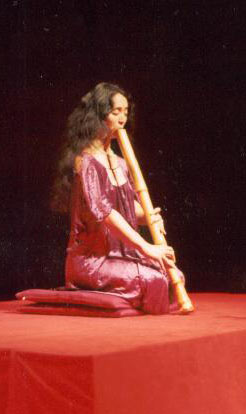Most of the flutes you will hear at the concert are an ancient style of shakuhachi called ji-nashi. Ji-nashi shakuhachi are made with an emphasis on the individuality of each piece of bamboo. Unlike the more popular modern shakuhachi with a filled, precise bore, ji-nashi shakuhachi are made using the natural shape of the bamboo bore wherever possible. This deceptively simple design gives them a rich, resonant, wild and windy tone. Although they require an astute receptivity to make and play, the effort is worth it as they are physically satisfying to play and hear.
Brian will be performing with a number of ji-nashi shakuhachi made by flute maker Ken LaCosse. Ken has been making shakuhachi since 1988. Beginning with modern shakuhachi, he now makes the ji-nashi style exclusively because of its distinct, challenging tonal possibilities. Ken and Brian have worked closely developing a unique style of large, expressive, ji-nashi shakuhachi called Taimu (The Big Nothing). They are both dedicated to promoting the resurgence of the ji-nashi shakuhachi style.
Kiku Day
 Kiku
Day is a ji-nashi shakuhachi player from Copenhagen, Denmark
with roots from Japan, America, Russia and Ireland. Born in Harajuku,
Tokyo, Japan, she moved to Denmark at an early age.
Kiku
Day is a ji-nashi shakuhachi player from Copenhagen, Denmark
with roots from Japan, America, Russia and Ireland. Born in Harajuku,
Tokyo, Japan, she moved to Denmark at an early age.She studied piano from the age of three, and flute from the age of fifteen. She was accepted at the Royal Academy of Music in Copenhagen, but chose instead to study honkyoku, the Zen Buddhist shakuhachi repertoire of the mendicant monks, komusô, with Okuda Atsuya in Tokyo.
After eleven years of honkyoku studies and traveling on all the continents in the world (save Antarctica), Kiku decided to move back to Europe, first to Switzerland, then to England where she completed her BA in Ethnomusicology with First Class Honours at SOAS (School or Oriental and African Studies), University of London. There she studied improvisation with Clive Bell, composition with Daniel Chua at King’s College, London. She has collaborated with the London Symphony Orchestra in an event at the Royal Festival Hall and performed at the Royal National Theatre with Clive Bell.
Kiku has recently completed her MFA in Performance at Mills College, Oakland, California, where she focused on contemporary music and improvisation. She has studied performance and composition with such teachers as Fred Frith, Jon Raskin, Joëlle Léandre, and Alvin Curran, and musicology with Nalini Gwynne and David Bernstein.
She currently performs in a trio with Pascal Marzan and Andras Vingh, another trio with Kanoko Nishi and Anne LeBaron, and a duo with Clive Bell, and has performed in many venues in Europe, New Zealand, Japan and America.
Kiku will begin a PhD program jointly at SOAS and Royal Academy of Music in London from September 2005, where she will explore the possibilities of the ji-nashi shakuhachi playing new music. The title of her PhD project is: Remembrance of Things Past: The Ancient Shakuhachi in Contemporary Contexts.
Scheduled performances include: Improvisation with Henry Kaiser (guitar) and Damon Smith (contra bass), Oakland, July 2005, Improvisation with Pascal Marzan (guitar) and Toshi Makihara (percussion), Budapest, July 2005, Is Arti Festival in Lithuania, November 2005, where she will play Takemitsu Tôru’s Eclipse with biwa player, Nishihara Kakushin.
Suginami Aikikai
Suginami Aikikai San Francisco, California started as "Skidrow Dojo" in the back of a photo studio on Sixth Street in San Francisco February 1986.
A group of artists asked James Friedman to teach them self-defense shortly after the violent murder of a loved one. Classes began in the shadow of tragedy, and Aikido in a small way helped heal the suffering these people were going through. Beginning as a club for that group of around ten friends, the dojo soon outgrew the Sixth Street studio and relocated to 759 Harrison Street in San francisco, California where it remained for three years.
After the 1989, San Franicisco earthquake, James moved the dojo a few blocks away to 57 Stillman Street, and it stayed at that location for ten years.
In 1999 we moved to our present and final location at 141 11th street, between Mission and Howard streets, San Francisco, California.
Since 1987 the Dojo has hosted many of the world's highest ranking Aikido instructors, including Kato Sensei, Nishio Sensei, Anno Sensei, Sugawara Sensei, Terry Dobson Sensei, Cottier Sensei.
In 1996 Kato Hiroshi Sensei was welcomed to San Francisco, and shortly thereafter "Skidrow Dojo" was renamed Suginami Akikai S.F. and became an official branch dojo of Suginami Aikikai Tokyo. Kato Sensei is our Dojo's official connection to the world headquarters - Hombu Dojo in
Tokyo, Japan.
In 1986 we started with two classes per week and ten students. That quickly progressed, and presently we have 24 adult classes per week, 3 kids' classes per week, two classes per week for mentally and physically handicapped adults, as well as Thai Kickboxing.